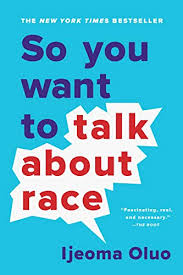Author: Ijeoma Oluo
ISBN: 978-1-58005-882-7
APA Style Citation
Oluo, I. (2019). So you want to talk about race. Hachette Book Group, New York, N.Y.
Buy This Book
https://www.amazon.com/dp/B07QBQF4GS/ref=dp-kindle-redirect?_encoding=UTF8&btkr=1
| activity_talk_about_race_.pdf |
Given the racial tensions that came to a head after the killing of George Floyd this past summer, demonstrations by many white supremacy groups, and the increasing diversity in the United States, a better understanding of how to discuss the issue in a way that promotes greater understanding is essential. Ijeoma Oluo provides these tools in So You Want To Talk About Race. As a social activist, Ijeoma often fielded questions about conversations regarding race that did not go well or addressed questions about how to bring up issues of race with family members, co-workers, or others who have behaved in a racially insensitive way. Oluo describes her intention to write this book as a toolkit that people can go back to as different issues regarding race come up in their own lives.
Oluo does not suggest that moving towards racial equality will be easy or comfortable. The intention of the book is to find constructive ways to engage in the conversation. Starting the conversation means accepting some facts about racial disparities in the United States: Someone with a black sounding (Jamal) name is less likely to be called back for a job interview than someone with a white sounding (Peter) name even when the credentials are equivalent. Living in a "black neighborhood" means that the value of a house will be less than a house in a "white neighborhood," and the person who owns the house is more likely to be paying a higher interest rate on the house's loan. One in three African-American men will spend some time in prison despite committing crimes at the same rate as Caucasian men. Black boys and girls are more likely to face more severe disciplinary actions at school (i.e., referrals, suspensions, expulsion) than their white counterparts for the same infractions.
Oluo makes a clear distinction between race as a social construct and dismisses the idea that social class rather than race is the primary factor in the oppression of African-Americans. A mistake that many will make in conversations about race is that intention drives offense. The first guideline Oluo provides is that if a person of color thinks it's about race-its about race. The second rule is that it is about race if it disproportionately or differently affects people of color. While there are many acts of overt racism (but not all), it is the daily slights that Oluo says add up to anger and frustration on the part of African-Americans. She describes being black in the United States as being in an abusive relationship with the world. To her, each time a person assumes she was promoted because of her race, told she is "too loud," or asked if someone can touch her hair is a cut that eventually leads to a huge wound.
Oluo is clear that these conversations are likely to go poorly, at least some of the time, but they are still important to have and continue having. We have to recognize that we might screw it up and have to work on doing things better in the future. She shares a conversation she had with her own mother (who is white) and assumed that she could understand her children's day-to-day life. Even though her mother had good intentions, as a white woman she could not understand what it was like to live as a black person. While Oluo provides many recommendations for engaging in these conversations, a few need particular attention.
- Don't make your anti-racism argument oppressive against other groups.
- When you start to feel defensive, stop and ask yourself why.
- If you are white, watch how many times you say "I" and "me".
- Ask yourself, "Am I trying to be right, or am I trying to do better?"
- Do not force people of color into discussions of race.
Oluo goes on to explain privilege and provides some questions for reflection regarding your own privilege. She recognizes her own privilege and challenges and encourages those who want to engage in meaningful discussions to address the advantages they may have experienced because of their gender, race, socioeconomic status, educational background, marital status, etc.
Oluo discusses intersectionality, which addresses the interconnectedness of many social categorizations. All of us have numerous identities, and each of these contribute to our interactions with the world. We cannot just look at an individual's race as their only defining factor. This makes fighting racism more complicated because elements of race are interwoven with other elements of a person. For example, a single black mother is more likely to live in poverty than a white single mother.
The book serves as a workbook for tackling tough conversations and provides a space for self-reflection about how each of us can contribute to changing racism one conversation at a time, it also dispels many myths and assumptions about discussions of race but does not shy away from the challenges ahead.
Other Related Resources
Google Talks: Ijeoma Oluo
Discussion with Ijeoma Oluo
https://www.youtube.com/watch?v=TnybJZRWipg
Author's Website
https://www.youtube.com/watch?v=TnybJZRWipg
NPR: Want to have better conversations with your parents about racism? Here's how
https://www.npr.org/2020/06/09/873054935/want-to-have-better-conversations-about-racism-with-your-parents-heres-how
The Cavalier Daily: So you want to talk about race
A toolkit for starting tough conversations
https://www.cavalierdaily.com/article/2020/07/so-you-want-to-talk-about-race
Interview with Ijeoma Oluo
https://www.vox.com/2020/6/9/21285062/ijeoma-oluo-interview-talk-race-book-george-floyd-protests
Psychological Concepts and Figures
Discrimination
In-group
Microaggressions
Out-group homogeneity
Prejudice
Stereotyping

 RSS Feed
RSS Feed